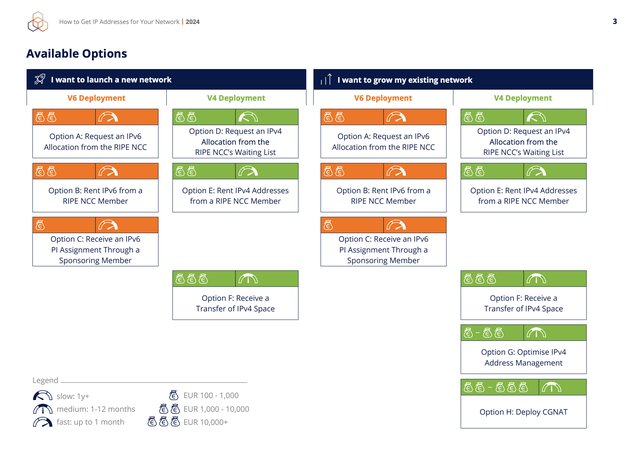Our new report provides network operators and businesses with an overview of the various options available for acquiring IP addresses today.
Every organisation running its own network needs IP addresses. The scarcity of IPv4 and the ability to transfer unused addresses between networks has created a dynamic secondary market with constantly fluctuating prices.

Navigating this complex ecosystem can be challenging for business decision-makers. This report provides a clearer understanding and a concise overview of how to obtain addresses both from the RIPE NCC and external sources.
Whether you are planning to launch a new network or expand an existing one, this document outlines the different options that are available to you. We collaborated with the external consultancy NEXOP to research the various ways network operators are acquiring IP addresses today. The supporting research was conducted in the spring of 2024 and combines financial data on IPv4 transactions, current market prices across multiple platforms, and insights gathered from interviews with ISPs, mobile operators, IPv4 transfer brokers, government representatives, and network consultants.
In this report, we identify eight options on how to acquire IP addresses:
- Request an IPv6 Allocation from the RIPE NCC
For larger or complex networks that require scalable, long-term solutions. Requires RIPE NCC membership. - Rent IPv6 from a RIPE NCC Member
Suitable for simpler networks or businesses looking for temporary solutions. - Receive an IPv6 PI Assignment via a Sponsoring Member
Ideal for smaller, simpler networks. Provides long-term control without renumbering when changing providers. - Request an IPv4 Allocation from the RIPE NCC’s Waiting List
Available to new or existing members who have never received IPv4 space before. Requires a considerable wait time and RIPE NCC membership. - Rent IPv4 from a RIPE NCC Member
Suitable for those who need IPv4 space quickly or on a temporary basis. - Receive a Transfer of IPv4 Space
Best for larger networks or businesses that need IPv4 long-term and are willing to invest in acquiring addresses. - Optimise IPv4 Address Management through IP Address Management (IPAM) tools
Suitable for those who already have IPv4 and are seeking to optimise the utilisation of their existing addresses so they can expand. - Deploy Carrier Grade Network Address Translation (CGNAT)
Applicable for those who want to grow their customer base without acquiring more IPv4 addresses by efficiently using their existing IPv4 addresses.
We plan to make this document available in more languages and are seeking volunteers in our community to assist with translations. If you’d like to help, you can apply using this form.





Comments 7
The comments section is closed for articles published more than a year ago. If you'd like to inform us of any issues, please contact us.
Jolita Puzakova •
IPv4 leasing would be a fantastic addition to the list, since it's a quick, flexible way to get IPs without the long-term commitment. IPXO makes it easy and affordable to lease and manage them. Worth considering!
Jordi Palet Martinez •
The previous message clearly is a marketing spam and I don't think should be authorized, specially considering that the report already mention leasing (renting). Instead, I think the report is missing the use of 464XLAT (IPv6-only as a Service), as a cheaper way to avoid CGN. Also the report doesn't mention the danger of CGN, with services such as Sony PSN that block for ever the IPv4 ranges used in CGN, so the cost of the CGN and every 6-8 months of IPv4 address space, exceeds the cost of an actual IPv6-only with IPv4aaS deployment.
Vincentas Grinius •
Jordi, you bring up good points about 464XLAT and CGN challenges. But why label Jolita’s comment as spam? IPXO is the only platform fully compliant with all RIR policies, supporting thousands of businesses globally in accessing IPv4 addresses. Isn’t that a valuable solution for those still navigating the IPv6 transition?
Jordi Palet Martinez •
Because articles aren't to promote specific companies? I don't think, in general, any company should be allowed to be self-promoted by "opinions" in an article. Not going to respond if IPXO or other brokers are or not fully compliant with all RIR policies ... Not planing to loop around this thread, so not responding again to this kind of questions.
Simon Leinen •
In the diagram, why are the IPv6-related options rendered in orange, suggesting danger, while the IPv4-related options are all rendered in green, despite their generally higher cost and/or longer lead times?
Jordi Palet Martinez •
Very good points ... I guess was not on purpose, but worth considering replacing the colors and making sure it doesn't happen again.
Anastasiya Pak •
Hi Simon - thanks for the comment. The choice of colours wasn't intended to indicate a difference in the properties of the options listed. The colours were picked because they were a clear contrasting pair from our branding palette. We take your point though and we'll take this feedback on board for future reports.